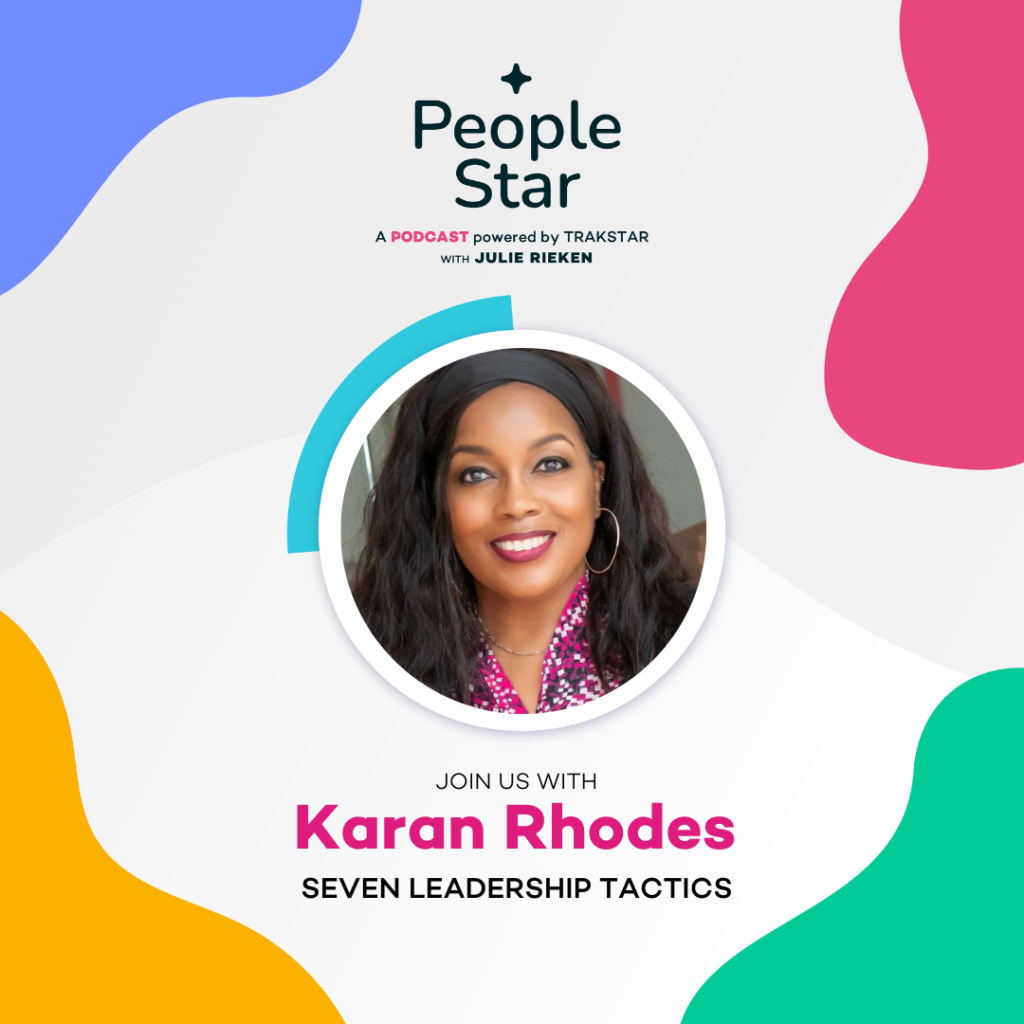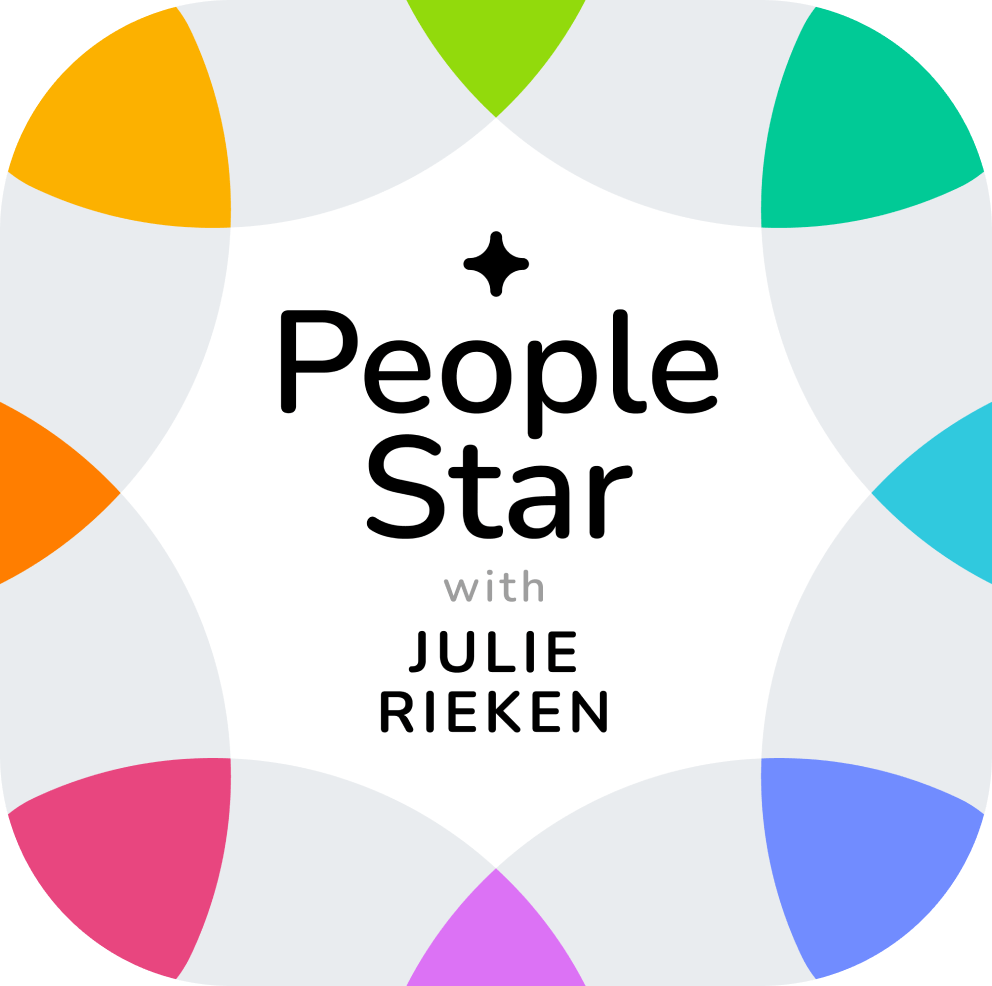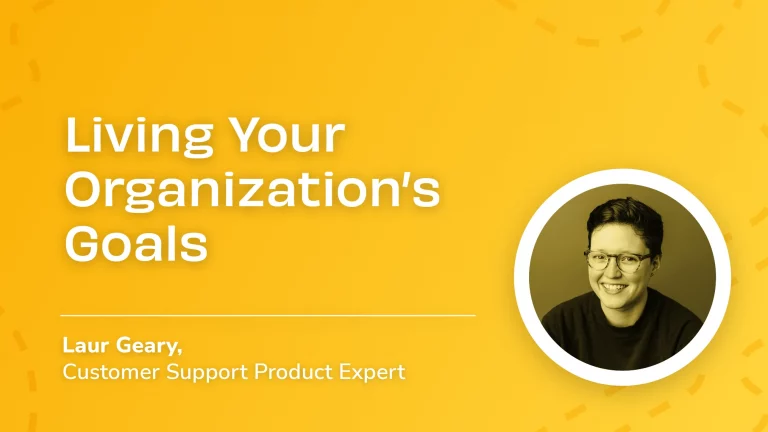PeopleStar_Karan Rhodes: this mp3 audio file was automatically transcribed by Sonix with the best speech-to-text algorithms. This transcript may contain errors.
PeopleStar Intro:
Welcome to the PeopleStar Podcast. We deliver leadership perspectives from industry experts on their people, architecture, routines, and culture as they solve HR's newest challenges. And now your host, Julie Rieken.
Julie Rieken:
Good afternoon, listeners Julie Rieken, host of PeopleStar podcast. Today I've got Karan Rhodes with us. Karen has a super exciting background. Let's just start with she is the author of Lead at the Top of Your Game, so we're going to talk about leadership and performance today, which I'm excited about, and her background backs it up. She's an organizational strategist who is obsessed with leveling leadership capability and optimizing workforces to do their best work. And I love this part, Karan, after years of witnessing the dark side of chaos and trauma caused by bad leadership within organizations, which I'm going to own, I'm sure I've caused my own share of chaos at some point, you ditched your comfy job as a corporate HR exec at Microsoft to commission a study to uncover critical success factors of high performing leaders. So I know we're going to have an interesting conversation today. Karan, welcome to the podcast!
Karan Rhodes:
Aww! Thank you so much, thank you for having me!
Julie Rieken:
So, oh my goodness, where do we start with how to lead and how do we talk about top-performing leaders? You've done research on this, let's just talk about what have you seen, what, you've talked about leadership execution, maybe we could define that, and then talk about what the most successful leaders do?
Karan Rhodes:
Yeah, I'd love to. Well, just to back up and give you a little bit of context, my last major job before leaving corporate America, as you mentioned, was working at the Microsoft Corporation. And there, I led a global high-potential leader program for the company. And then, I've had previous Fortune 100 experiences with other organizations, but there was always a common thread, no matter if I was leading an HR team or a talent development team or what have you, the common thread is that many of the employees always struggled and when they really wanted to put their best foot forward, and to be honest with you, I have not ever met a leader that did not want to see the best out of their team, and I've never seen a team member that didn't want to show their best and demonstrate their best. But for some reason there was many times tension between employees and their leaders or whatever was going on, organizational dynamics wise, within the org, within the company. So I was just really passionate about trying to find out how can we make a better match and create an environment where employees can show up as their best selves and leaders can see that and it can contribute to the bottom line, so yeah.
Julie Rieken:
… I've got to say, there's never been a leader that showed up that said, I want to demoralize this team. And so it goes one way. So I love that. Okay, continue.
Karan Rhodes:
No, you're totally right. So fast forward, as I mentioned, I had worked with a group to commission a research project. And organizations, in my opinion, generally do a pretty good job on teaching leadership theory to their employees, but where I found the missing link was in actual leadership execution. How do you carry out leadership skills, acumen, and decisions day to day? Because you're going to hit a roadblock day to day. And what do you do when you struggle? And what are some of those best practices? So anywho we did a variety of research methods, but we studied over 10,000 individuals who were deemed extremely strong leaders within the organization, had tons of interviews and follow-ups and all kinds of things we won't go into, I could talk for days about that, but long story short, what came out of the research were there were seven tactics that were common to all of those individuals who were deemed high-performing leaders. And there were more than seven in existence, but there were seven that was common with everyone. So I thought it would be fantastic to write a book about those seven, since that was universal, no matter the individual or the industry. And if I could get that out into the world, maybe we would see more successes within organizations. So I can share those seven real quickly with you if you like.
Julie Rieken:
Oh, I would love it. That's, it sounds like a massive research project.
Karan Rhodes:
It was.
Julie Rieken:
I want to know the seven. Let's, … Listeners, let's do it.
Karan Rhodes:
Okay. So bear with me really quickly. So the first tactic was leading with intellectual horsepower. Intellectual horsepower is all about using your areas of expertise to spot trends and connect dots that others may miss. So these people were very astute in their profession or industry and brought up opportunities to their organizations or improvements. Second one was, a tactic was leading with courageous agility. That's all about having the fortitude to take calculated risk and stand up for what you believe in, even if you don't know what's going to happen in the future, basically doing the right thing, if you will. The third tactic was they leading with strategic decision-making. And as you know, strategic decision-making is all about making good decisions or leading a good decision-making process with their teams. The fourth tactic was leading with Intrapreneurship, so very similar to entrepreneurship. Intrapreneurship focused on watching out and suggesting new opportunities to develop either new products and services or to improve operations within the organizations. The fifth tactic was leading with a drive for results, and that's exactly what it sounds like. It was all about being tenacious and focused and get ensuring that the goals are ultimately achieved. The sixth tactic was leading with executive precedence, and that's all about making clear and convincing presentations on what you're trying to lead so that others are inspired to follow. And then the final tactic was leading with stakeholder savvy, and that's all about really understanding interpersonal dynamics and ingesting oneself based on the environment and situation. So very assister tactic to emotional.
Julie Rieken:
And I have to say this is a brilliant list. I expected.
Karan Rhodes:
Oh, thank you!
Julie Rieken:
Number one, be like communication. I didn't expect that from you. But like sometimes lists can be, lists can be very general, and this is really specific.
Karan Rhodes:
It's just …
Julie Rieken:
… You looks like, because intellectual horsepower, courageous agility, this is not, this is a different kind of list.
Karan Rhodes:
It is, and in full transparency, these are leadership tactics or approaches, you know tactics are actual actions that individuals do while leading an effort. So, you know, and you usually use all of them at some point, no matter when you lead, but it's calling on the right one when you need it. So if you're going into the C-suite staff meeting, you know you're going to have to have your executive presence game on because you're going to have to provide the right data, have the right confidence, be clear and concise in order to win them over and gain their buy-in, right? You also going to have to have some stakeholder savvy to understand where their priorities are and how that aligns with the business parties of the organization. And I can go on and on, but under each of those tactics there's a whole other world, you know, there are definitely competencies that you can develop to be more proficient at those tactics. But these are the seven big buckets of leadership execution tactics that all successful leaders demonstrated in one shape or form during their leadership efforts.
Julie Rieken:
I love that. When I'm looking at this, I'm wondering in your head, think of these seven, do you have an example of one of them in mind? Like one time I saw this leader do this thing and it was the best example of blank.
Karan Rhodes:
I do. I have, well, one of the favorite stories I love to tell is I interviewed a young lady who was a rising star as a real estate agent. Her back story was that she had a couple members in her family who were disabled. But we're trying to, you know, live their lives with their abilities. And when she turned to her real estate agent, she understood that members of the disabled community had a hard time finding homes that could be adapted for their physical needs.
Julie Rieken:
My god.
Karan Rhodes:
So she made, and she was with a regular popular brokerage firm that will remain unnamed, you know, have permission to say the name but very popular, you would recognize it. And she made the decision to really differentiate herself and she use intrapreneurship, meaning improving upon their products and services. She decided to focus on helping those with challenges find homes that would suit them. She also created partnerships with contractors and companies that had equipment and would adapt homes for those that are physically challenged, and she created a whole business around that. It became so popular that this famous real estate brokerage actually created divisions, four divisions throughout the US and they permitted her to be the leader of the divisions. Like, she created a whole new sub-industry under real estate that they had not tapped into before. And she had the market because very few other real estate brokerages were doing that. So she was in a very niche area, but she was a superstar within that niche and that was just from being open to her life experiences and her family experiences. So I thought that was just insanely bright of her.
Julie Rieken:
I just got chills from that. That's, …. the intrapreneurship, you must have some intellectual horsepower when you were talking about her knowledge of the industry and her ability.
Karan Rhodes:
Yes.
Julie Rieken:
… here's a group of people, they're struggling to find homes that are adaptable for their unique situations. How can I be, how can I be creative in that space?
Karan Rhodes:
That's right. Then she, had to use her stakeholders savvy to really get in and interview them and understand what are some of the more common needs and had to kind of have empathy, human empathy for them and walk a day in their shoes so that she could provide those needed services or have options for them. So you go right down the line, she touched on every single one of these in some way, shape, or form as she advocated for the new division. And because of that, she's become very renowned in not just the brokerage, but in the industry and really serving the underserved. She's amazing. She always pops top of mind for me.
Julie Rieken:
I love that. That is, that is such a good story of leading at the top of your game, as intrapreneur suggests, and how did she do that? And I love it. One of the things that you mentioned was the idea to compel others to follow and get buy in. She seems like she was able to do this at this brokerage because they opened other divisions. But in general, this is a thing that we all as leaders are trying to do. We're trying to make, we're trying to take a risk.
Karan Rhodes:
Yes.
Julie Rieken:
Eye for results, make a change and we have to have our teams buy-in. When you think about that, can you just talk to us about these seven trends and how do you get buy-in? I know that's a big question, but I need some advice here.
Karan Rhodes:
Well, if I had the magic pill, I probably would be a multi-trillionaire right now. But what I will share that I've learned and I do talk to organizations and clients about this, gaining buy-in is not about you, it is about your target audience, who it is that you're trying to try to bring along on the journey? Who do you want to try to follow you or to agree with what you're trying to do? And although you might have a goal that you want their buy in, you've really got to start with understanding how what you're wanting to do ties in to what matters to them. And so that is, involves a lot of pre-conversations and questions and curiosity about what's top of mind for them because what will capture their attention. You know, we're all attention-drained these days, right? You've got to find an answer to one of the questions that is keeping them up at night and do your best to connect it to what you truly want to do yourself. So if you can find that intersection between what you want to do and how it can help them in a positive way, that will greatly accelerate the cycle of buy-in. And one of the things that we talk about is the influence journey. I have it in my book, we talk about what steps it takes and what you'll need to do to help move people along on that journey that, to influence them, to follow your lead. And so once you do so, that is what will accelerate the buy-in at some point.
Julie Rieken:
Because I do feel like it's about us and we have to remember that it's really about them now.
Karan Rhodes:
It's about them. You got to tie it into one of their priorities. Yes.
Julie Rieken:
That's just a good reminder. It feels like it should be intuitive. But, you know, it's good to remind ourselves of that every day.
Karan Rhodes:
It is. And you know what? Julie, and I forgot to give this disclaimer upfront, but all of the research and all of our training and workshops that we do, I always tell people, this is not rocket science, there's nothing that I'm saying here that should stump you or no terms that you should know it, to your point, it's easy to understand, it's common sense. They're great reminders, but it's it's the list of things to, to focus on, to help you get to your end goal a little bit quicker and easier than otherwise. So this means anyone can learn this. And think about a company of 50,000 people. If you got half of them to do these seven at all times and stay focused and bring their A-game, can you imagine the impact of the company?
Julie Rieken:
It's really powerful to think about that. And I love this conversation because when we think about the things that when we manage performance for individual contributors, we think about specific things and what do we remind people to do every day. But really, I think sometimes leaders of the idea of reminding leaders and helping leaders develop that game can sometimes go by the wayside.
Karan Rhodes:
You're right.
Julie Rieken:
And I think more than, the reach can be really important. So I feel like this is, this is such an important thing to think about what are the things that that we see? What are the seven tactics that are important for leaders to remember and think about? So, I love it.
Karan Rhodes:
I have a question for you, Julie, out of the seven, what popped out for you? What resonates for you in your day-to-day, or what do you think would accelerate your buy-in, if I was trying to convince you to follow me and something, did any one of these pop out for you that really resonated or that you would love to see more in organizations?
Julie Rieken:
Well, a couple, two, there were two. One of them was just to remember the stakeholders. Now, that's not, that, you talked about stakeholder savvy and getting buy-in. Sometimes I do fall into the idea that it's about me and it's not. And that reminder every single day.
Karan Rhodes:
Yes, right. That's right.
Julie Rieken:
So that one really, really rang true. And then the other one that rang true was this idea of courageous agility. That's really hard, and I do believe that leadership is an act of courage because we're all.
It is.
Julie Rieken:
…Water. We're all the water crew. Like, I can't believe she did that thing.
Karan Rhodes:
Yeah. So, right.
Julie Rieken:
… You worked or it didn't work, you know? You really put yourself out publicly as a leader and and having courageous agility to take risks and feel comfortable in that space is an important leadership trait and one that I think a lot of us struggle with every day. Like, how do I do this in such a way that I'm getting buy-in and not resistance?
Karan Rhodes:
That's right.
Julie Rieken:
But that risk taking is important and yet it's hard, so that one resonated for me. Like when I think about what would I want to be, what would, personally, what would I, well, I want all seven, obviously, because I didn't want to say, boy, I want to be worse. I do want all seven. But that one was like, oh yeah, I want to dig into that a little bit more personally.
Karan Rhodes:
Now, that makes a lot of sense, that makes a lot of sense.
Julie Rieken:
What about for you? Which one which one resonates for you?
Karan Rhodes:
Well, you know, I'm an idea gal, a strategic but idea gal. So I love to think in a world of possibilities, but I'm really good about once we talk about the world of possibilities, helping to narrow those down to what would be strategically best for an organization, that's kind of a hit in talent. So for me, definitely intrapreneurship is just big, just because it resonates with me. And then obviously strategic decision-making, so making the right decisions and bringing people aboard so that we can execute. But just like you, all seven really resonated with me and I was so happy when it came out of the research. I was like, oh my god, this is something I could talk about all day, every day, because I was pleasantly surprised to see what came out of the research. Definitely, because I could, as you have, understand how it, they all tie back into the organization in one way, shape or form.
Julie Rieken:
They do, so, okay, let's close on two things. Number one, we're going to link to your book in the show notes because I can't wait to get my hands on it. So many good things in here for me to learn and receive, so I'm excited for that. I hope some of our listeners do too. And you also have a quiz that.
Karan Rhodes:
Yeah!
Julie Rieken:
… Do for you, and I think I want to take it and I bet some others do too. So can you just tell us about this quiz that you have? And I believe it's around leadership triggers. So tell us a little bit more about that. I think that will be of interest to.
Karan Rhodes:
Yes, absolutely. So along with the research, we actually created a leadership assessment on leadership execution and it focuses on measuring one's acumen on all these seven tactics. But then we also created, we thought it'd be interesting for individuals to also know which tactics are the ones that are my triggers, which are the ones that would make me raise my hand and say, yes, I want to follow Julie, you know, on this leadership initiative, I want to volunteer, I want to support her. So we created a quiz to help people understand which of these tactics must resonate with them. And it's a very quick free quiz, where you could use it is when you're having 1:1s with your peers or your bosses or team members. It's information that you can share to help them understand how to approach you when you know they need your support so that you have the information that you need in the way that you need it. So hopefully it'll accelerate those professional relationships and deepen each other's understanding. So it's called. What is your leadership trigger? It's very quick, probably about 3 minutes to take and you will get a five page report on what is your trigger and information about all seven just so that you can read up a little bit more in depth about them.
Julie Rieken:
We've just empowered some leaders today.
Karan Rhodes:
Yay, that's great. That's my mission.
Julie Rieken:
… Karan, thank you for being a guest. I've had fun and I think this has been so, it's just such a good learning experience for me and for other leaders that are listening. Thank you.
Karan Rhodes:
Thank you. I've had a ton of fun myself.
PeopleStar Outro:
Thanks for listening to the PeopleStar Podcast. For the show notes, transcript, resources, and more ways to get a seat at the table, visit us at TrakStar.com/Podcast.
Sonix has many features that you’d love including world-class support, secure transcription and file storage, automated translation, transcribe multiple languages, and easily transcribe your Zoom meetings. Try Sonix for free today.




